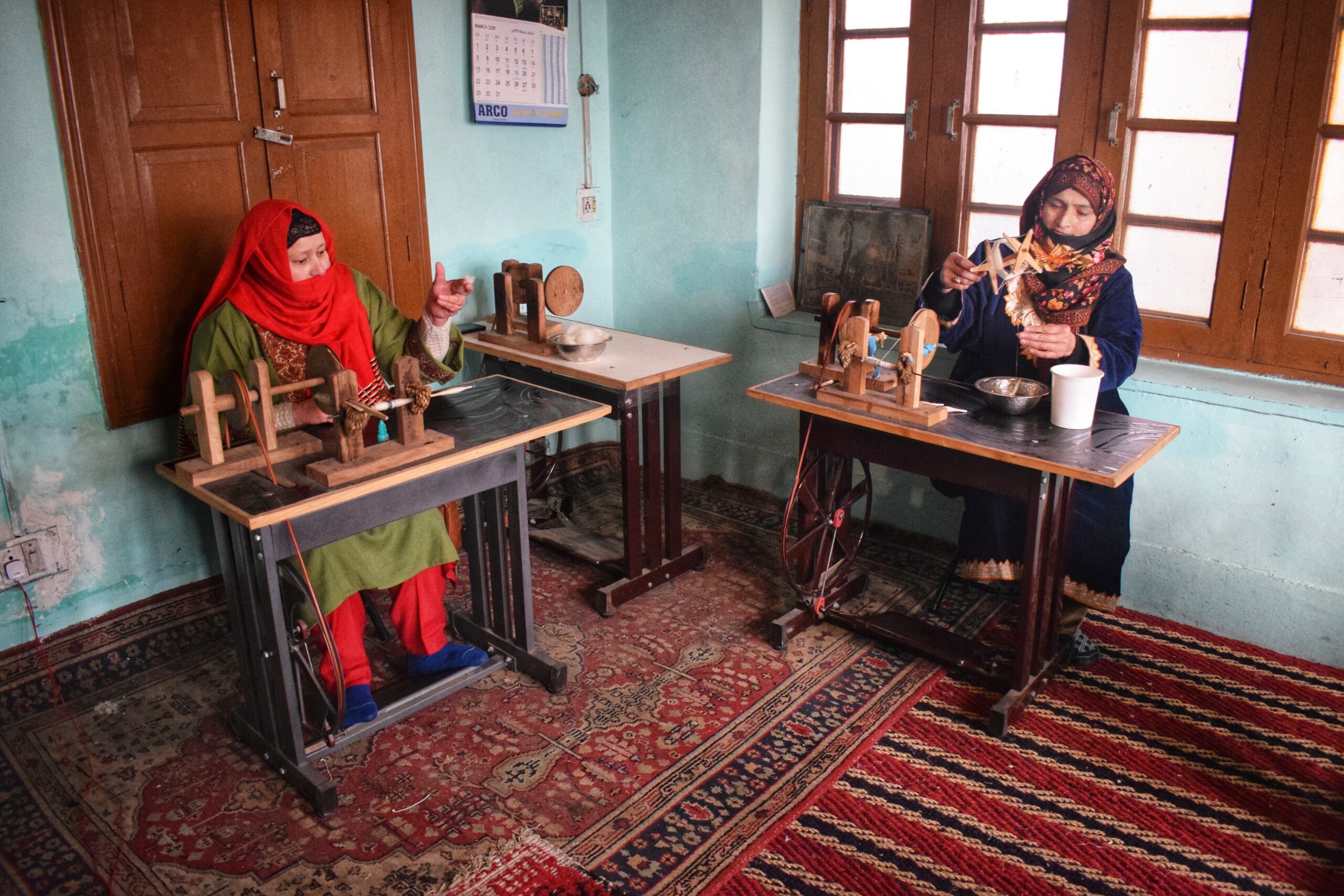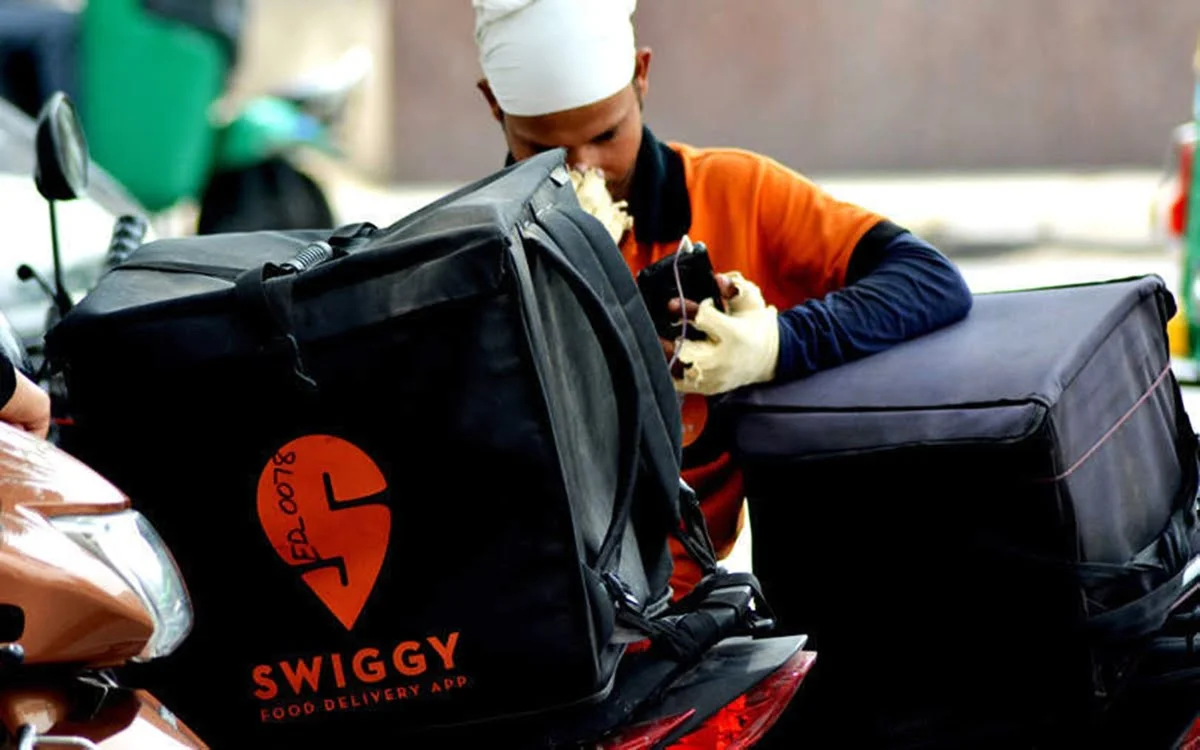Srinagar, J&K: Situated in the heart of Srinagar city, Eidgah is the place where a family runs a shawl manufacturing company under the name of ‘Me and K’ which provided 300 modern charkhas to local women for free after a training program to spin pashmina and silk threads. The women earn a good amount of money to fulfil their own needs.
The women in the Kashmir valley are trying their best to preserve the declining spinning wheel craft with foot-operated charkhasat a time when technology has replaced many traditional livelihoods.
The women in the Kashmir valley are trying their best to preserve the declining spinning wheel craft with foot-operated charkhas at a time when technology has replaced many traditional livelihoods.
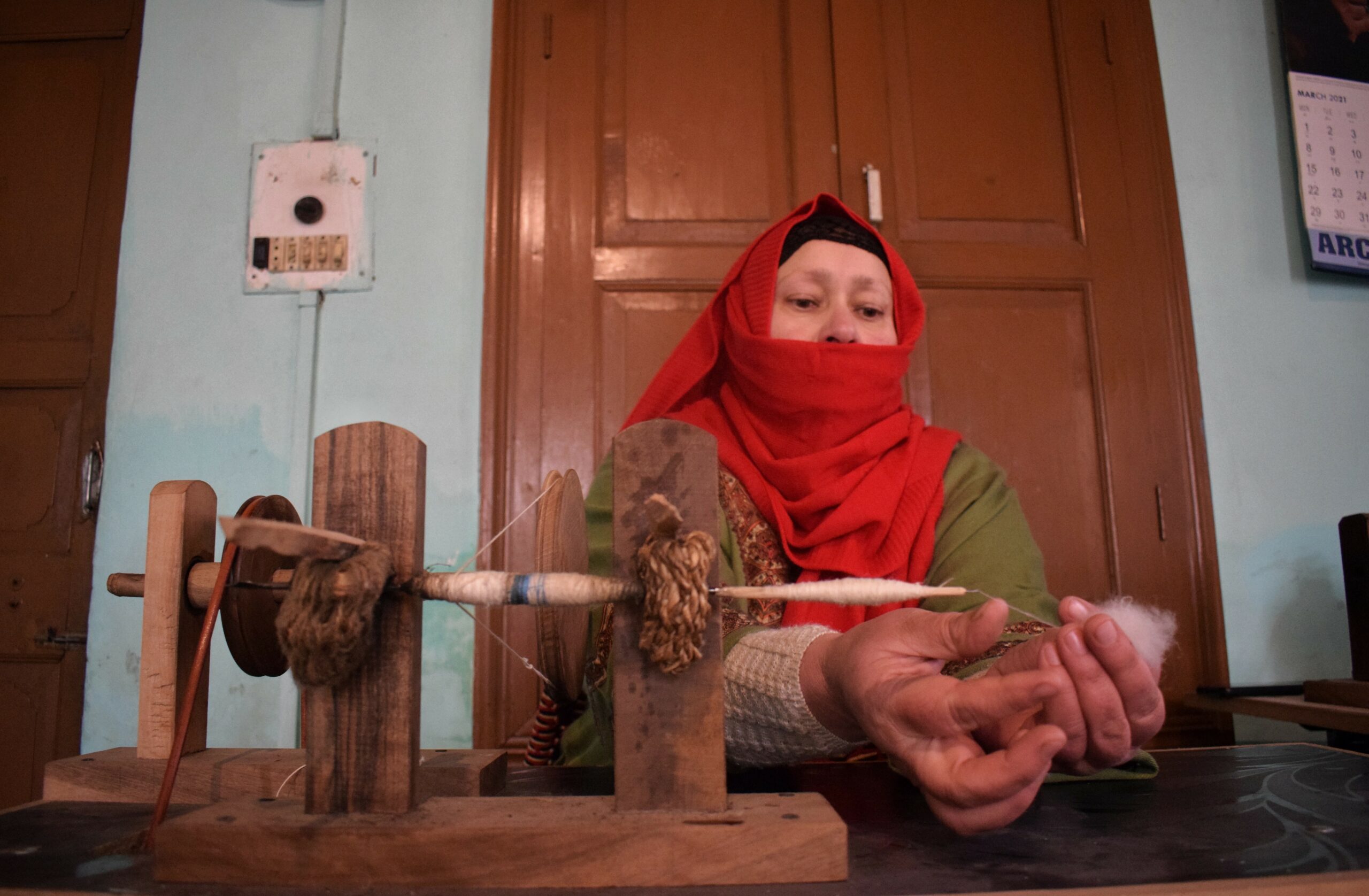
A lady, Rafeeqa (35), hailing from Natipora Srinagar, an artisan working at ‘Me and K’, told Feminism in India that she saw a post on social media regarding this training centre. She then came here and started her training.
‘I was doing this job of spinning wheel craft for the past ten years, but then I left for some personal reasons. But now, after the centre introduced standing charkhas which helped us to keep our back and legs straight, I joined back here.’
‘Charkha or ‘Yinder’ is a symbol of our glorious heritage here in Kashmir, and it is still in our society and emotionally very dear to us. In early times, the Yinder was regarded as an important possession of every family and was used for spinning wool or pashmina, but with the passage of time, this culture started vanishing slowly from our homes,’ said Rafeeqa.
Path from old Yinder towards modernisation
The old charkha (Yinder) which was in Kashmiri homes was difficult to use, as it made artisans stand still for a long time, causing pain in the back and arms. But as technology advances, modernisation has made this tradition again alive in the heart of Srinagar city.
The old charkha (Yinder) which was in Kashmiri homes was difficult to use, as it made artisans stand still for a long time, causing pain in the back and arms.
‘My life has improved since I started working, and now after completing my training period, I can make money without leaving home,’ a lady named Saba from Sonwar told FII while one of her feet was on the paddle, and she was working on her pashmina product.
Many other Kashmiri women like Saba had spent their years in this craft of pashmina making while working behind a wooden spinning wheel, commonly known as Yinder in the Kashmiri language.
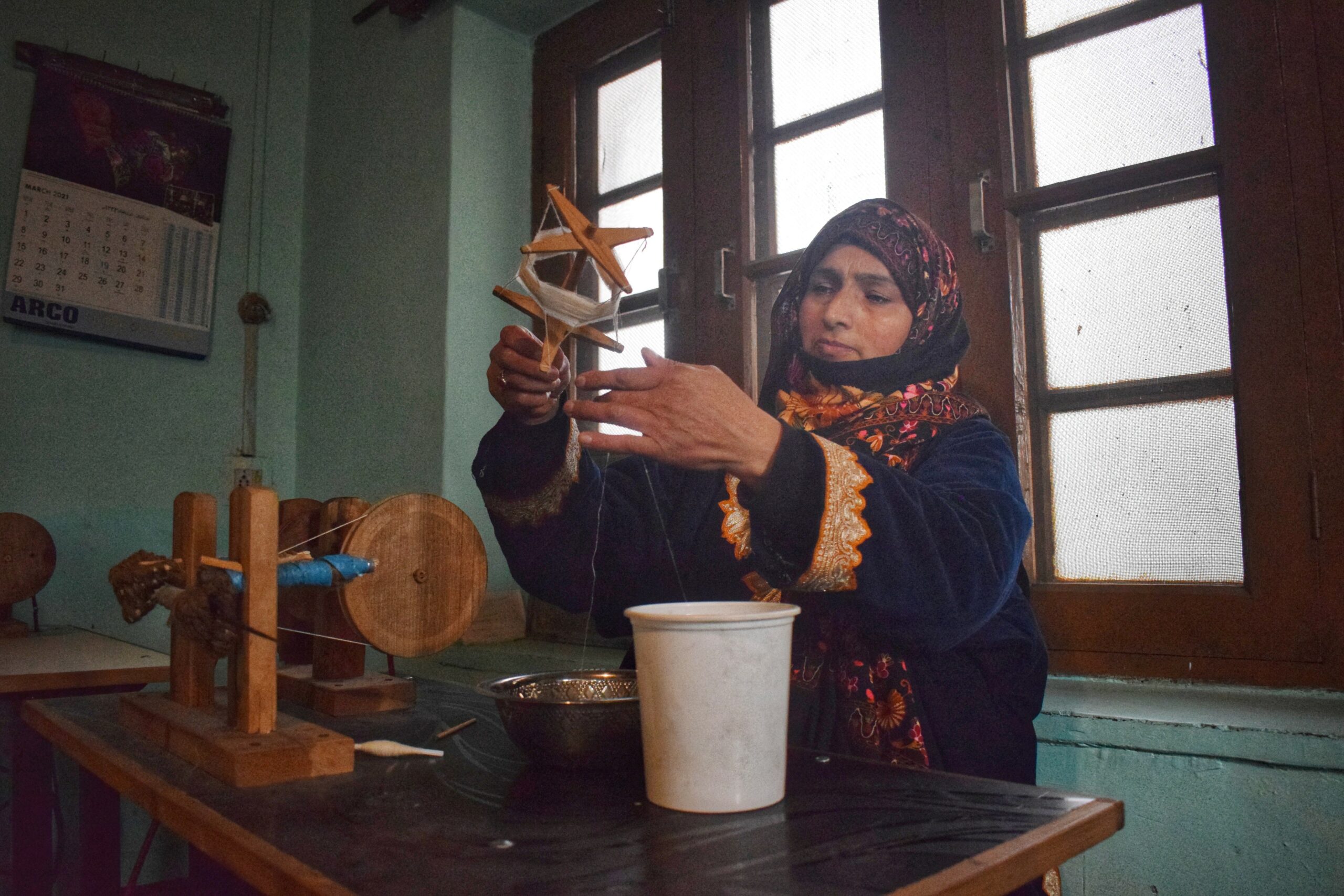
Lovely Jan aged about 39, hailing from Hawal in Srinagar, told FII she was in depression before joining the centre, but now her life has totally changed, and she can feel there is hope for her, too, in the dark.
‘In today’s world, women should be financially independent and don’t need to be dependent on her family or anyone else, and if she has any skill she can earn from that and can live her own life‘
Lovely Jan
‘I used to sit at home the whole day before starting my training. I came to know about the training centre through my sister-in-law who used to come here, and when I first heard about a spinning wheel that works by a pedal to yarn pashmina, I was amazed as I wanted to see the machine, and there the idea about joining got stuck in my mind,’ said Lovely. ‘Since I have been here, my depression has gone, I started feeling calm and happy,’ Lovely told FII.
‘In today’s world, women should be financially independent and don’t need to be dependent on her family or anyone else, and if she has any skill she can earn from that and can live her own life,’ added Lovely.
The spinning wheel in Kashmir
It is said that the art of spinning or the ‘Yinder Tradition’ was introduced in Kashmir by Hazrat Mir Syed Ali Hamdani (RA), popularly known as Shah Hamadan, who is a revered Iranian figure. He was the one who introduced the pashmina craft to Kashmir and brought artisans from Iran to teach this art here. The spinning wheel is locally called ‘Yinder’ in Kashmir and is considered an important part of Kashmiri tradition, used to spin wool or pashmina.
Another woman, Masrat from Rainawari Srinagar, present at the centre added that, in today’s times most women here in Kashmir are tense and stressed as they lack jobs.
‘Most women in Kashmir are housewives who don’t work, and if they start earning on their own, their mind will be free, and they can fulfil their financial needs and hence live a happy and prosperous life,’ said Masrat adding that not only can men achieve something big, a woman should also be sufficient to help herself or her family economically ‘Due to prolonged issues, women in Kashmir have silently suffered, due to which their physical and mental health has seen worse effects,’ added Masrat.
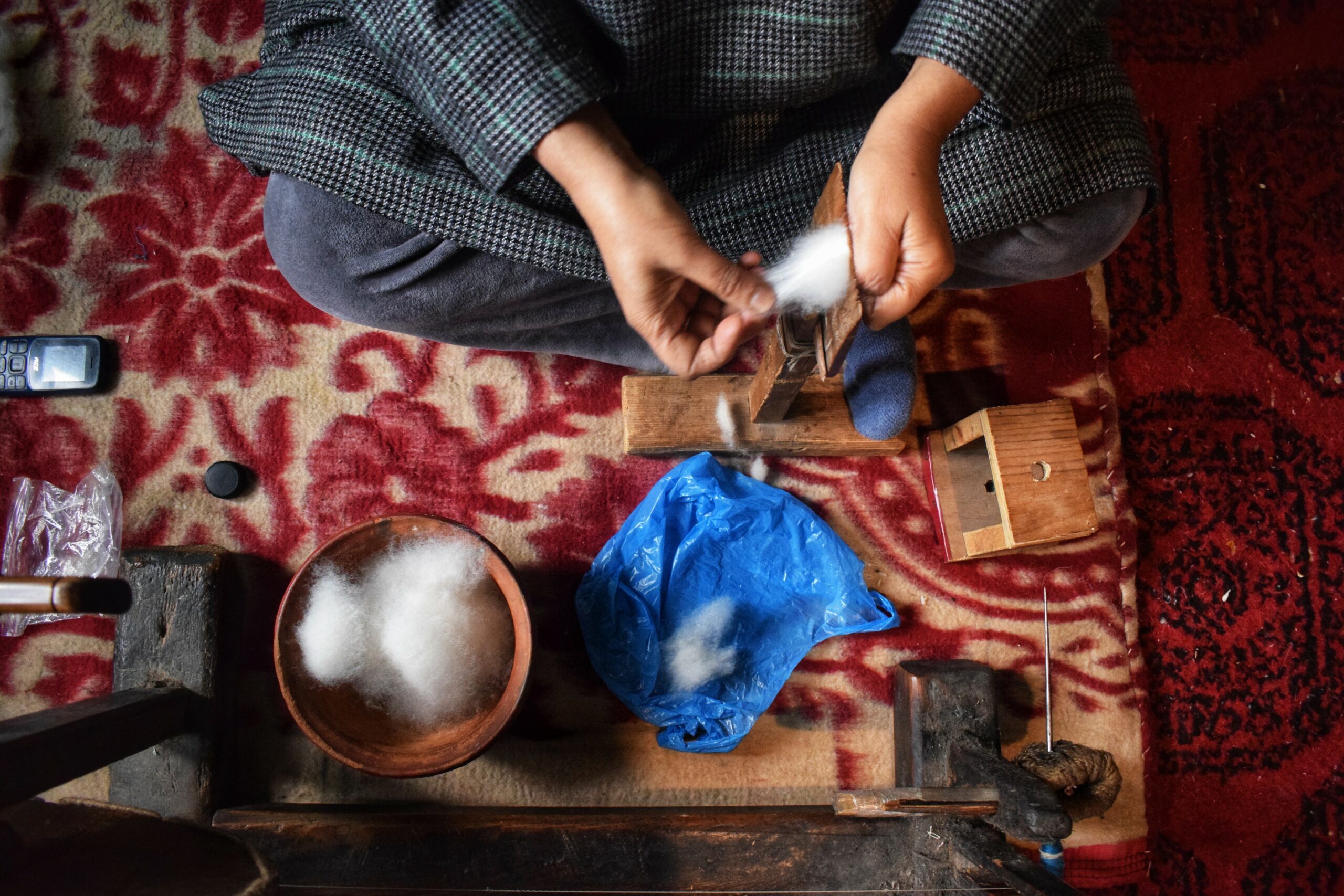
Yasmeena, aged 35, a female trainer from Zadibal Hawal area told FII till now she teaches almost 600 women about this new modern charkha, due to which their life became better.
‘I have taught almost 600 women till now, and my mission is to make Kashmiri women fully independent. The women here don’t need to be dependent on anybody. Whoever came here for training doesn’t go without learning; everybody learns something here, and no one goes with empty hands,’ she added.
Yasmeena, aged 35, a female trainer from Zadibal Hawal area told FII till now she teaches almost 600 women about this new modern charkha, due to which their life became better.
There is a difference between the old and modern spinning wheel. As this model wheel is based on modern technologies, it can be set up on the table, so the artisans don’t sit on the ground, and it is foot-operated making the work easy, and fast. Its tablet design also relaxes the back saving it from pain. It processes the pashmina very fast, and does a lot of work as compared to the old one. Pashmina signifies an authentic luxury fabric woven from the fine wool of Himalayan goats, renowned for its softness, warmth, and elegance. The highest grade Chyangra Pashmina is handcrafted by carefully spinning and weaving it using traditional methods like Yinder
‘After completing the training, we start working from our home. After learning a lot and getting benefit from the centre, we are now independent and don’t need to be dependent on anyone,’ share Bisma, a lady from Chattabal, Srinagar.
‘I learned the pashmina craft very fast and after finishing my training, I was given the modern spinning wheel of Pashmina to home free of cost’ Bisma told FII. She added that without a woman everything is impossible; if a woman earns her own livelihood, she can give a better education to her child. She added that before she got trained, her children were at a government school, and after getting trained and starting her own livelihood, she changed their school. All this happened only after she became self-dependent.
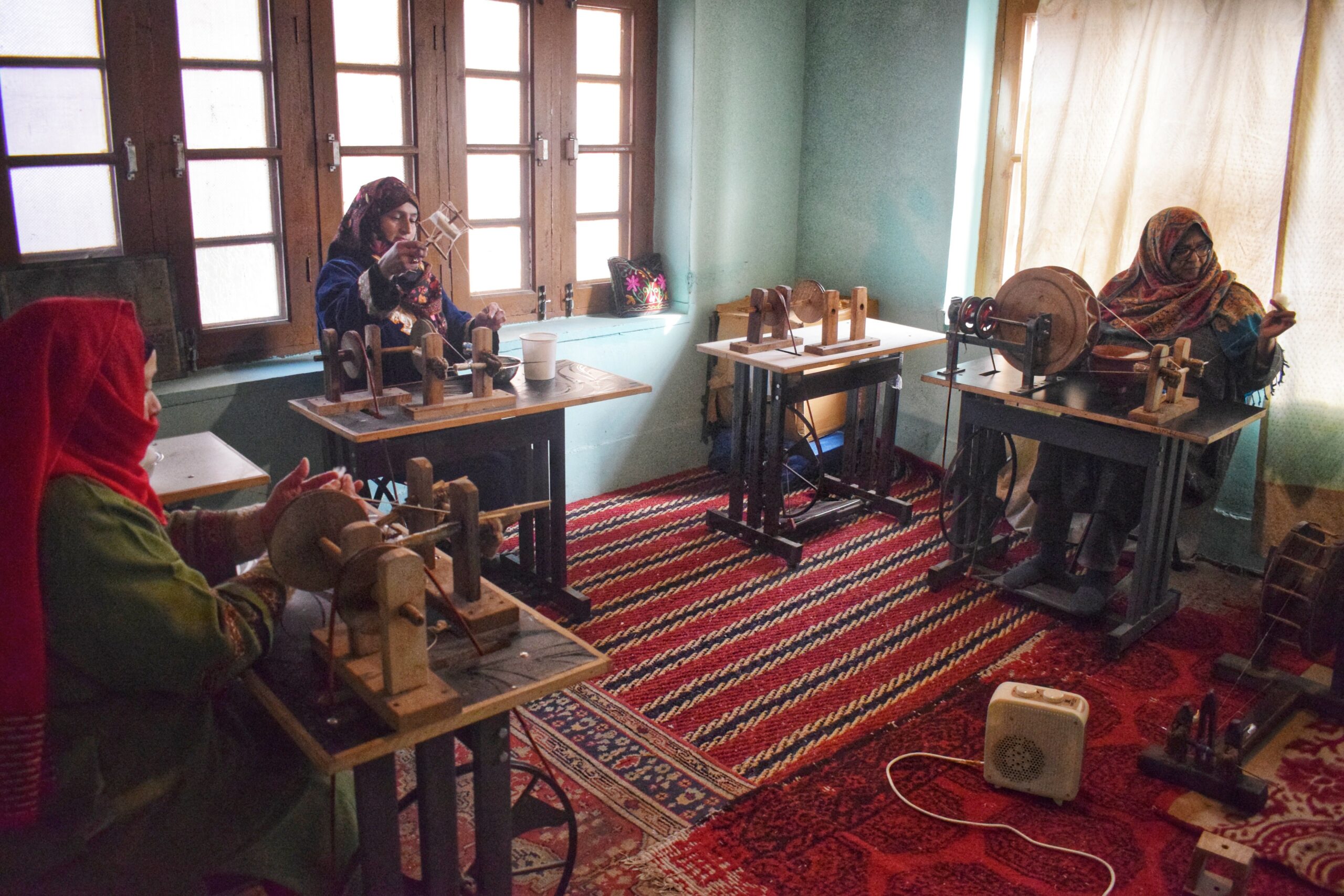
‘I have been working here for the last two years. I have almost taught 350 ladies from the last two years,’ said Mehak, a 24 years old girl, and a spinning wheel teacher hailing from Hawal in Srinagar.
She told FII, that the work of teaching trainees was done by her mother after which, she followed suit and soon got involved in the centre. Besides this job of teaching trainees, she had a master’s degree as well.
The highest grade Chyangra Pashmina is handcrafted by carefully spinning and weaving it using traditional methods like Yinder
‘Nothing is impossible in this world, and if a person really wants to achieve something, they have to do hard work, and one day, they will achieve their goal,’ she added.
Yinder and Kashmir’s tradition
In the early times, the art of spinning was so important that it was regarded as a qualification for a girl for marriage in Kashmir. In each and every house, there was one woman who used to work with this traditional Yinder craft. ‘I remember my grandmother used to work on the traditional Yinder and make stuff while using the spinning wheel (Yinder). The old Yinder was time-consuming and painful, but after the Yinder saw a revolution the work became easy,’ said Sahila, a female student from Khanyar Srinagar, while recalling her old memories
